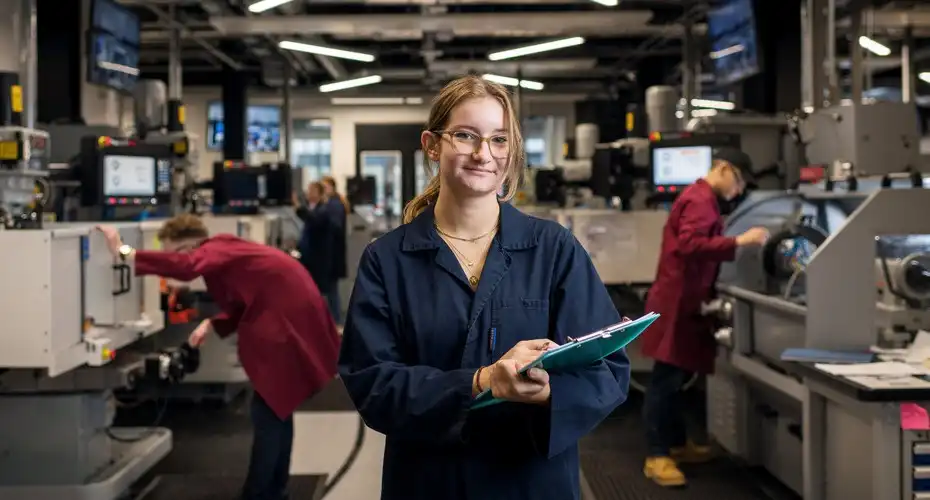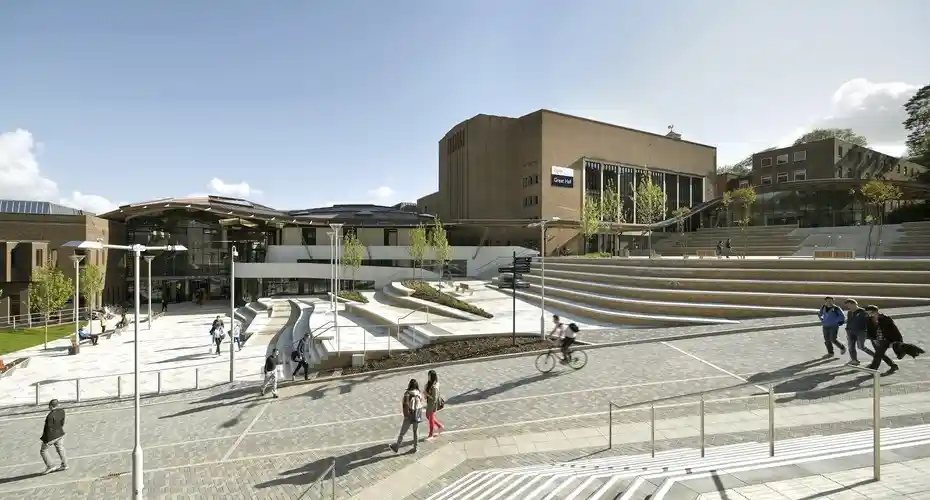| Degrees |
MPhil/PhD Film Studies |
|---|---|
| Duration |
| Start date | September, January or April |
|---|---|
| Location | Streatham Campus |
| Study modes | Full time or part time. Distance-based research available. |
Overview
Join a vibrant, rich and varied Film and Television Studies research culture at Exeter
Our main areas of research specialism are:
- History and theory of American cinema
- War and visual media
- Film and television archives
- Queer film and television
- British and European cinemas
- Transnational and world cinemas (African, East Asian, Latin American and diasporic cinemas and filmmakers)
- Early and silent cinema
- British and American TV
- Film technologies and special effects
- Gender and sexuality
- Cinema audiences
- Film and literature
- Stars, acting and performance
- Adaptation studies
- Genre studies
- Sound
Contact
Web: Enquire online
Phone: 0300 555 6060 (UK)
+44 (0)1392 723044 (non-UK)
![]()
World-class film research resources, including the Bill Douglas Cinema Museum – the largest university library collection in the UK
![]()
Develop transferable skills, specialist knowledge and research skills through interdisciplinary teaching
![]()
10th for Media and Film Studies
Guardian University Guide 2023
![]()
World-leading research and teaching team
![]()
World-class film research resources, including the Bill Douglas Cinema Museum – the largest university library collection in the UK
![]()
Develop transferable skills, specialist knowledge and research skills through interdisciplinary teaching
![]()
10th for Media and Film Studies
Guardian University Guide 2023
![]()
World-leading research and teaching team
Research overview
Research centres and groups
The Centre for Interdisciplinary Film Research (CIFR) provides a lively interdisciplinary research forum for research staff, academics, postgraduates and film practitioners. It encourages intellectual exchange between film theory, history and practice and regularly hosts external speakers from academia and the creative industries. Past speakers have included filmmakers Dn Boyd, Mike Figgis, Mike Leigh and Nicolas Roeg, screenwriter Andrew Davies and sound designer Tom Sayers, and film researchers such as Catherine Grant, Richard Dyer, Murray Pomerance, and Patrick Keating.
The wide range of expertise in film studies is reflected in the diverse range research projects that our current PhD students are working on. These projects include:
- Fairytale films and ageing female characters
- orphans in Spanish cinema
- girlhood in contemporary French cinema
- American independent cinema
- cinema and the city
- "Chineseness" in Spanish cinema
- Muslim representation in post 9/11 cinema
- the historical epic on film
- digital cinematography
- video games and literature
- gender and screenplays
- south African documentary cinema
- post-1987 South Korean cinema
Film Studies’ postgraduates are part of a vibrant research culture at Exeter. Staff and research students regularly present their research in the Centre for Research into Film Studies forum, which also hosts visiting speakers. Film studies staff and students also regularly organise conferences which attract a range of international speakers. Recent examples include the 2nd conference for the International Society for the Study of Surrealism (ISSS) in 2019, and the Stardom and the Archive international symposium in 2020.
As well as receiving extensive research training, mentoring and supervision to support their research projects, many PhD students also undertake training and practice in teaching, leading to a recognised qualification in higher education teaching. All PhDs are supported in learning to teach through our innovative shadowing scheme, pairing you with an experienced academic, and the Learning and Teaching in Higher Education programme.
Students also get to meet world-renowned film practitioners on a regular basis to test out their ideas and work. Honorary professors of film include – director, producer and screenwriter Don Boyd and and film critic Mark Kermode, who make regular visits to the University to deliver specialist workshops and tutorials.
How to apply
Entry requirements
Students applying to enter directly into the MPhil/PhD programme would normally be expected to have a Masters degree with Merit or equivalent in Film Studies, or other relevant qualifications such as a doctorate in another subject.
Requirements for international students
If you are an international student, please visit our international equivalency pages to enable you to see if your existing academic qualifications meet our entry requirements.
English language requirements
International students need to show they have the required level of English language to study this course. The required test scores for this course fall under Profile E: view the required test scores and equivalencies from your country.
PhD and Research Programme application process
The information below applies to self-funded PhD, MPhil and Masters by Research applicants, but if you are applying for a funded PhD studentship, please follow the specific instructions related to that application.
- Pinpoint your PhD research area
- Investigate whether this area is available at Exeter
- Ensure that you meet our English language entry requirements (international students only)
- Construct and refine your PhD research proposal
- Approach your potential supervisor(s)
- Apply online
PhD studentships pages can be accessed in our Funding lists on Finance tabs under each research topic page, and are also available from the Postgraduate Research search results pages on this site, on the PhD projects tab.
Full details of the application process can be found on our Apply now webpage.
Fees and funding
Tuition fees per year 2025/26
- Home: £5,006 full-time; £pro-rata part-time
- International: £23,500 full-time
For those studying for more than one year, our fees are expected to increase modestly in line with Consumer Price Inflation measured in December each year. More information can be found on our Student Finance webpages.
Tuition Fees per year 2024/25
- Home: £4,786 full-time; £pro-rata part-time
- International: £22,600 full-time
For those studying for more than one year, our fees are expected to increase modestly in line with Consumer Price Inflation measured in December each year. More information can be found on our Student Finance webpages.
Our Postgraduate Funding webpage provides links to further information. If you are considering a PhD in the future, in addition to University of Exeter funding, we have been successful at securing postgraduate funding for PhD research through our Funded centres.
Current available funding
Supervision
You can expect:
- High-quality research supervision to develop and nurture your potential
- A tailored supervision approach to help best suit your requirements
- Accessible supervisors who are enthusiastic about working directly with postgraduate research students
- Regular timetabled meetings with your supervisor
- 'Open door' policy to all postgraduate students - instant access to world-leading researchers who will share their expertise and ideas with you
- Regular meetings with your supervisory team, other members of your research group, and mentors
You will only be able to pursue a research degree with us if we can offer appropriate supervision. Your supervisors will provide the necessary support and guidance and so need to have expertise in your chosen research field. You may join a research team or work with specific members of staff.
We strongly recommend that you informally approach your potential supervisor(s) with your research proposal before submitting a formal application to study. This will enable you to find out if they feel they would be able to supervise you and whether they believe your research proposal needs further refinement.
Visit our how to apply page for detailed information on the application process.
Facilities
Exeter has unique resources which make it ideally positioned to support the advanced study of film. The Bill Douglas Cinema Museum for the History of Cinema and Popular Culture holds a wide-ranging collection of more than 70,000 film related artefacts. The collection is accessible for all postgraduates to use as a research and study resource. Housed in the University’s state-of-the-art study facility, the Research Commons, the diverse collection includes objects relating to the history of the moving image. These include optical toys, magic lantern slides, a Lumière cinematograph; film publicity such as posters from the Hollywood era to contemporary film; material on film stars such as Charlie Chaplin, Marilyn Monroe and Audrey Hepburn; and material on animation, particularly Disney films.
Streatham campus also hosts the The Digital Humanties Lab – a state of the art facility offering unique spaces, equipment and training for staff and students in Film & Television studies. A specialist team conducts and supports innovative Digital Humanities research and offers training and teaching. The Lab undertakes the digital preservation and display of historic material and artefacts using advanced technologies.
Our library also has significant holdings in the area of Film and Television Studies including books, journals and more than 10,000 films and television programmes on videotape and DVD. Our Audio-Visual collection in the University library comprises over 12,000 film titles, in addition to books and recordings of American music of all kinds.
All postgraduates enjoy access to excellent computing facilities. The postgraduate common room in the Queen’s Building provides a relaxing space where postgraduate students can meet and work together in reading and discussion groups.
The Bill Douglas Cinema Museum opened in 1997 as part of the British celebrations of the centenary of cinema. The Centre's remit is to encourage the ongoing enjoyment, understanding and study of film. The Centre provides a research collection of international stature, illustrating the development of optical recreation and popular entertainment from the late 18th century to Classical Hollywood and the present day.
Complementing the University's existing extensive resources for the study of popular culture, the Collection's 18,000 books give Exeter the country's largest University library on cinema. They are a permanent, uniquely valuable resource for postgraduate students and researchers, and also contribute to the remarkably varied undergraduate degree programmes at Exeter. Explore the Bill Douglas Cinema Museum collections.
London Film School (LFS) is the first film school in the UK. Since 1956 LFS has trained thousands of directors, cinematographers, editors and other film professionals now working across the globe. Alumni include many great filmmakers and very successful technicians, covering all kinds of cinema - names like Mike Leigh, Michael Mann, Tak Fujimoto, Roger Pratt, Ueli Steiger, Iain Smith, Danny Huston, Franc Roddam, Anne Hui, Duncan Jones and Bill Douglas. LFS is one of only three ‘Skillset Film Academies’, accredited by the UK film industry as a Centre of Excellence.
Working together
The University of Exeter and London Film School have entered into an agreement, which will enable postgraduate and doctoral film students to hone their filmmaking skills alongside their academic studies.
The alliance has enabled the institutions to launch a number of initiatives, including the MA International Film Business. This programme offers students the chance to develop a unique set of skills related to the business of the film industry on both practical and theoretical fronts. They will have access to the professional expertise, experience and facilities at the LFS as well as to the academic excellence of researchers, research culture, and academic resources at the University of Exeter.
LFS Governors
Members
Greg Dyke, Professor Diana Green CBE DL, Graham Easton, Kemal Akhtar, Olivier Kaempfer, Peter Armstrong, Helen Dudley CBE, Julie Parmenter, Guy Wilson.
Careers
We are committed to ensuring you receive high quality research supervision to maximise your potential and prepare you for a rewarding career.
Postgraduates also have access to the wide range of support offered by our Career Zone. In addition, postgraduate research students can access our Postgraduate Researchers' Programme, which covers a range of topics to help you to succeed during your research degree and to act as a springboard for your research career.
Graduate destinations
Below are some examples of initial jobs undertaken by English postgraduates who studied with us in recent years.
| Job title |
|---|
| Vice President of creative content |
| Screenwriter |
| Lecturer Creative Media |
| Information Systems Analyst IV |











